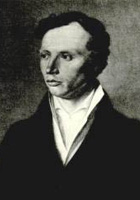Johann Ludwig Uhland
Johann Ludwig Uhland Poems
Die linden Lüfte sind erwacht,
Sie säuseln und wehen Tag und Nacht,
Sie schaffen an allen Enden.
O frischer Duft, o neuer Klang!
...
Clouds seh I abendwaerts
Completely dipped into purest glow,
Clouds in light zerhaucht completely,
Had so stifling darkened.
...
Ich hör' meinen Schatz,
Den Hammer er schwinget,
Das rauschet, das klinget,
Das dringt in die Weite
...
Ich hatt' einen Kameraden,
Einen bessern findst du nit.
Die Trommel schlug zum Streite,
Er ging an meiner Seite
...
'T was Pentecost, the Feast of Gladness,
When woods and fields put off all sadness.
Thus began the King and spake:
...
Of Edenhall, the youthful Lord
Bids sound the festal trumpet's call;
He rises at the banquet board,
...
Three students once tarried over the Rhine,
And into Frau Wirthin's turned to dine.
...
'Hast thou seen that lordly castle,
That Castle by the Sea?
Golden and red above it
The clouds float gorgeously.
...
Ich bin so hold den sanften Tagen,
Das ist der Tag des Herrn!
Ich bin allein auf weiter Flur;
...
Johann Ludwig Uhland Biography
Johann Ludwig Uhland, was a German poet, philologist and literary historian. Biography He was born in Tübingen, then Duchy of Württemberg, and studied jurisprudence at the university there, but also took an interest in medieval literature, especially old German and French poetry. Having graduated as a doctor of laws in 1810, he went to Paris for eight months to continue his studies of poetry; and from 1812 to 1814 he worked as a lawyer in Stuttgart, in the bureau of the minister of justice. Poetry He had begun his career as a poet in 1807 and 1808 by contributing ballads and lyrics to Seckendorff's Musenalmanach; and in 1812 and 1813 he wrote poems for Kerner's Poetischer Almanach and Deutscher Dichterwald. In 1815 he collected his poems in a volume entitled Vaterländische Gedichte, which almost immediately secured a wide circle of readers. To almost every new edition he added some fresh poems. His two dramatic works Ernst, Herzog von Schwaben (1818) and Ludwig der Baier (1819) are unimportant in comparison with his Gedichte. As a lyric poet, Uhland must be classed with the writers of the romantic school. Like them, he found in the Middle Ages the subjects which appealed most strongly to his imagination. Yet his style has a precision, suppleness and grace which distinguish his most characteristic writings from those of the romantics. Uhland wrote poems in defense of freedom, and in the states assembly of Württemberg he played a distinguished part as one of the most vigorous and consistent of the liberal members. Politics When in 1815 Württemberg was to be granted a new constitution, his lyrics in praise of liberty were received with enthusiasm. As a member of the legislature from 1819 to 1826, he sided with the opposition. In 1829 he was made honorary professor of German literature at the University of Tübingen, but he resigned in 1833, when the post was found to be incompatible with his political views. In 1848 he became a member of the Frankfurt Parliament that convened in the course of the 1848 revolution. Philology and Literary History As a Germanic and Romance philologist, Uhland must be counted among the founders of that science. Besides the treatise Ueber das altfranzösische Epos (1812) and an essay Zur Geschichte der Freischiessen (1828), there are to be especially mentioned Walther von der Vogelweide, ein altdeutscher Dichter (1822); Der Mythus von Thôr (1836), the result of the most painstaking original investigation; and the masterly collection Alte hoch- und niederdeutsche Volkslieder (1844–45; 3d ed. 1892). His poetical works were repeatedly published as Gedichte und Dramen, while his scientific work is embodied in Schriften zur Geschichte der Dichtung und Sage, edited by Holland, Keller, and Pfeiffer (1865–72). He died on 13 November 1862 in Tübingen. Translations Longfellow translated some of his pieces into English. Alexander Platt translated his “Poems” (Leipsic, 1848), W. W. Skeat his “Songs and Ballads” (London, 1864), and W. C. Sanders his “Poems” (1869). Legacy One of his best known poems is "Ich hatt' einen Kameraden", which is an integral part of military funerals. A town located south of Austin, Texas is named in his honor.)
The Best Poem Of Johann Ludwig Uhland
Frühlingsglaube (Faith In Spring)
Die linden Lüfte sind erwacht,
Sie säuseln und wehen Tag und Nacht,
Sie schaffen an allen Enden.
O frischer Duft, o neuer Klang!
Nun, armes Herze, sei nicht bang!
Nun muß sich alles, alles wenden.
Die Welt wird schöner mit jedem Tag,
Man weiß nicht, was noch werden mag,
Das Blühen will nicht enden.
Es blüht das fernste, tiefste Tal:
Nun, armes Herz, vergiß der Qual!
Nun muß sich alles, alles wenden.
Faith In Spring
The gentle winds are awakened,
They murmur and waft day and night,
They create in every corner.
Oh fresh scent, oh new sound!
Now, poor dear, fear not!
Now everything, everything must change.
The world becomes more beautiful with each day,
One does not know what may yet happen,
The blooming doesn't want to end.
The farthest, deepest valley blooms:
Now, poor dear, forget the pain!
Now everything, everything must change.
